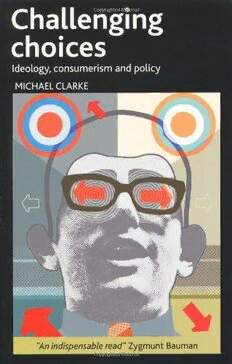
Challenging Choices: Ideology, Consumerism and Policy PDF
217 Pages·2010·1.288 MB·English
Most books are stored in the elastic cloud where traffic is expensive. For this reason, we have a limit on daily download.
Preview Challenging Choices: Ideology, Consumerism and Policy
Description:
Choice pervades our society, and for good reason. We live in a society founded on political rights to choose and in an economy based on market choices, but we have now reached an opposite extreme in which choice is extended almost everywhere. Choice has become an ideology: more is invariably seen as beneficial, and often as a solution to policy issues. This lively and topical book provides a critique of choice in contemporary society and policy, arguing that we can have too much of a good thing. A severe lack of choice frustrates and disadvantages us, and having choices empowers us, but constant extension of choice overwhelms us. And there are alternatives. In part one, the author shows how choice works at a personal level, its demands, and how it can fail to work at the personal and policy levels. By examining key policy issues such as healthcare, education and pensions, he then explores the alternatives to choice, such as provision. In part two the book reviews the impact of choice on us through the life cycle, identifying the demanding choices that are now required in respect of jobs and careers, relationships and fertility, retirement and death. From the trivial to the momentous, choices now dominate our lives to an extent that has dramatically increased in a short time. In a concise and readable style, the author considers whether this enhances or burdens our lives, and questions the blithe assumption that more choice is always for the better.
See more
The list of books you might like
Most books are stored in the elastic cloud where traffic is expensive. For this reason, we have a limit on daily download.
